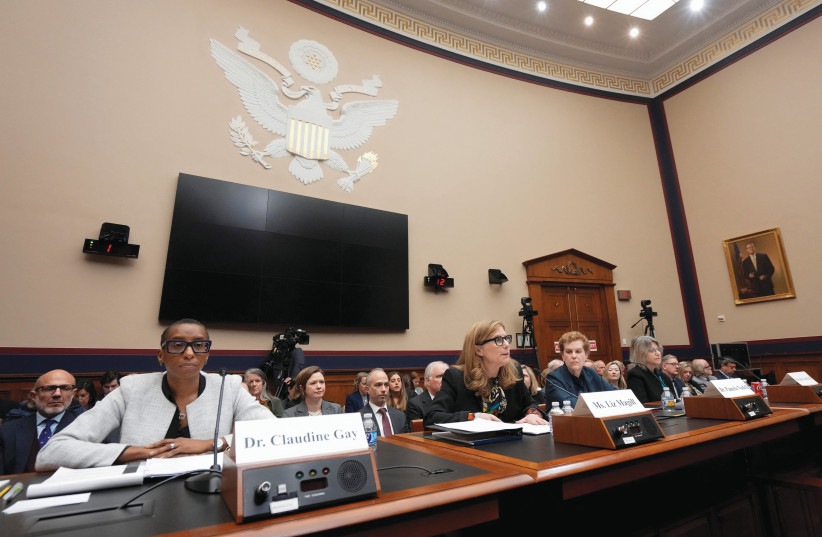In the aftermath of the notorious congressional hearing in which the presidents of three of America’s finest learning institutions miserably failed to unequivocally commit to fighting antisemitism, Claudine Gay has resigned as Harvard’s president.
But between the partisan crossfire and accusations of racism, the issue that started the debacle in the first place has been decentered. The suffering of Jews on campus and the harrowing experiences they face have been subsumed by America’s culture wars.
University heads' evasiveness during Congressional hearing
During the hearing, Congresswoman Elise Stefanik posed to Gay a simple enough question: “Does calling for the genocide of the Jews violate Harvard’s rules of bullying and harassment? Yes or no?” This was one of many questions, posed by several officials that did not receive a real answer, only a legalese non-answer, evasiveness masquerading as nuance.
This same pattern of behavior was exhibited by former University of Pennsylvania president Liz Magill and MIT president Sally Kornbluth.

In the wake of the hearing, allegations against Gay of plagiarism surfaced, and she soon resigned.
In an op-ed in The New York Times, Gay describes receiving a subsequent torrent of hate mail, much of it containing racial slurs.
This is, of course, vile, and Gay deserves sympathy for undergoing such an appalling experience. But she quickly cast claims of racism in a broader context, beyond the racists and the alt-right.
Antisemitism marginalized in progressive discourse
This moved the conversation away from the issue of antisemitism, marginalizing it, which happens often in progressive anti-racist discourse.
She wrote, “Those who had relentlessly campaigned to oust me since the fall often trafficked in lies and ad hominem insults, not reasoned argument. They recycled tired racial stereotypes about black talent and temperament.”
Never mind that most of the same people advocating for her to resign are those who also advocated for (and achieved) the resignation of Liz Magill, a white woman, and are advocating for the resignation of Sally Kornbluth, a Jewish woman.
In Gay’s letter of resignation, she used “I” sixteen times and the word “my” ten times, highlighting her own perceived victimhood. She mentions the “tension and divisions” and “weakening the bonds of trust and reciprocity.” But she does not mention anything about how these relate to the core of the issue: rampant antisemitism on Harvard’s campus.
Jews on campuses become scapegoats for anti-Israel hatred
AMONG CALLS to “globalize the intifada” and other thinly veiled slogans calling for violence against Jews and Israelis, Jews on Harvard’s campus (and many other campuses) have become the scapegoats for the hate leveled at Israel.
Most Jews on campus (and in America in general) feel a connection to the Jewish state, but it is not political in nature. They are not representatives of the Netanyahu government, and many have never even been to Israel.
Despite these facts, Jews are often made to either hide their Jewish identity, condemn the state of Israel unequivocally, or face ostracization and social rejection in some progressive settings, just because they are Jewish and seen as “Zionist agents” and oppressors.
The Anti-Defamation League reported that between the October 7 massacre and December 7, there was a 337% increase in antisemitic incidents in the US compared to the same period in 2022.
In at least 750 of these incidents, synagogues and Jewish institutions on campus were targeted. Yet in the wake of the congressional hearing, this issue is strikingly absent from the anti-racist discourse.
Following Gay’s resignation, Ibram X. Kendi, the prominent author and the founder of the Center for Antiracist Research at Boston University, took to X (formerly Twitter) to lament the alleged racial motives of those who advocated for Gay to step down.
He said, “Racist mobs won’t stop until they topple all Black people from positions of power and influence who are not reinforcing the structure of racism.”
What about the racism against Jews?
Double standard imposed on Jews
In an interview on MSNBC with Nikole Hannah-Jones, the creator of the 1619 Project, the interviewer said, “A lot of Americans have been hoodwinked, they think Claudine Gay is out because she said something antisemitic, which she didn’t.”
Then they proceed to discuss the targeting of Black people in academia. They almost imply that to criticize Gay’s handling of the situation and calling for her to step down is racist. And the entire issue of antisemitism is dismissed and swept under the rug in one sentence.
Throughout the interview, a screen behind the speakers showed the words “Double Standard,” referring to the alleged double standards imposed on Black academics. But the events’ original double standard, which should be one of the elements at the heart of the discourse, is the double standard Jews experience when they claim they are being targeted.
If there were individuals on campus calling for the genocide of Blacks and other minorities, Harvard would have taken swift and strong action, but not so for the Jews.
This pattern is illustrative of a bigger-picture trend in which many progressives don’t put the Jewish struggle against antisemitism under the umbrella of championing, allyship, and sympathy as the struggle of other persecuted minorities.
This is because many progressives argue that Jews are the beneficiaries of white privilege and systemic oppression, having achieved success at the expense of minorities. This also interacts with the view of some progressives that Jews on campus are connected to or blameworthy of the actions of the Israeli government.
Of course, racism against Black people endures in parts of American society, and it should be vigorously combated wherever it rears its ugly head. But the anti-racist discourse should also include reflecting on the discrimination faced by Jews, historically and currently one of the most persecuted minorities in the world.
The author is a professional technical writer in the hi-tech industry and an independent journalist focusing on extremism, disinformation, and Mideast history and politics.
